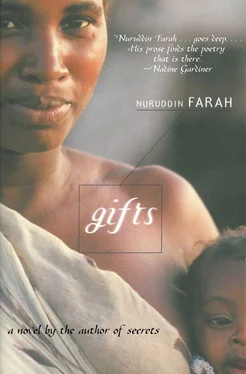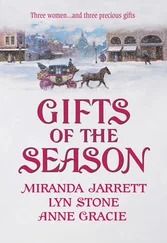When he left, the subject of conversation suggested itself to the gathering. Did the older waiter make one feel better and more comfortable because he had been trained by the Italians and had been more adept at his profession than the younger ones who had probably never received as rigorous a training as him? Was this symptomatic of the situation, a regrettable condition in which Somalis were seldom able to run a restaurant proficiently and also profitably? The ball was kicked around, now Mire scored a goal, now Bosaaso and now Abshir. Nasiiba, Yarey and Mataan listened respectfully. Duniya couldn’t help remarking to herself how silent Nasiiba had been since Abshir’s arrival.
As the others engaged in polite talk, Duniya thought to herself that little is revealed to oneself directly. Revelations are received from out of a mist of doubts, in caves, in the dark, out of a child’s mouth, or via the wise utterances of an elderly or mad person. She decided that her own epiphanic instant had occurred at a moment, on a morning, when a story chose to tell itself to her, through her, a story whose clarity was contained in the creative utterance, Let there be a man, and there was a story.
Half-attentive to her guests at the table, Duniya looked at Abshir, who had an unlit cigarette in one hand, and a light in the other. And he was saying to Mire, “Claudia sends her love, and she gave me a parcel for you and a letter. Now here is the letter,” and he gave it to him, “but the parcel is in Bosaaso’s car, but I didn’t bring it into the restaurant because it is too bulky to cart around.”
“Thank you,” Mire said, putting the letter in his pocket.
At the mention of Claudia’s name, Mire’s features seemed too reticent, too unprepared to display emotions in the presence of others. In fact, he appeared uninterested in asking Abshir questions about Claudia. Instead he asked, “When will you come to dinner at my place?”
“Give me a day or two and I’ll be able to know what my plans are,” Abshir replied.
“Take your time.”
Abshir nodded.
Mire said to Abshir: “How long are you here, by the way?”
“A maximum often days.”
Duniya’s centres shifted. The skin on her face felt too tight, like that of a woman half-way through washing off her make-up and who receives a visitor. She was thinking that beginning the story had been easy, like extracting a milk-tooth. But how was she to end it?
Here, she paused, for the waiters had come, bringing the food. Looking at the pepper-steak, she told herself that it was not she who had ordered it, but another Duniya. But where was this other Duniya?
She looked around, and everyone seemed to be pleased with what they had been given, and some of those present had started eating, and she heard bon appetit said a number of times. Garlic, pervasive as love, permeated the senses, and everyone smelt of it, even those who were not eating dishes which contained the root.
She was asking herself if she was content that her guests could get on with the telling of their respective stories without her. And the other Duniya with her tale? Then someone was mentioning her name, pairing it with Bosaaso’s, and Abshir was raising a glass in a toast. Everyone else was standing up, only Duniya remained seated. Her children were coming round to hug her, and they were saying sweet things in her ears and wishing her well Mire left his place at the head of the table, and came round to congratulate her, and Abshir responded in a toast, coupling her name with Bosaaso’s, but the speech was brief, and in it he gave an elder brother’s love and blessings to a younger sister getting married. And Nasiiba broke a glass when she had emptied it, and Mataan said that only a wedding at which something broke was considered lucky. Bosaaso and Duniya were treated as man and wife.
Whom was Bosaaso married to?
Which Duniya?
This or the other?
She wished she knew.
Duniya, the chronicler, is no longer certain how to go on, and nothing short of a much longer pause will enable her to look back on the events as they took place in order for her to describe them accurately.
At one point Nasiiba said to someone, “Don’t all stories end in marriage or the dissolution of such a union?”
Abshir was chain-smoking while speaking; among other things, he was saying that all stories are one story, whose principal theme is love. And if the stories feel different, it is only because the journeys the characters are to undertake take different routes to get to their final destination.
More toasts were drunk, and champagne was offered to those who wanted it.
“All stories,” concluded Abshir, “celebrate, in elegiac terms, the untapped sources of energy, of the humanness of women and men.” Then Duniya smelt Bosaaso’s odour, because he had come round to where she was sitting, and they were kissing while the others toasted them again and again. The world was an audience, ready to be given Duniya’s story from the beginning.











